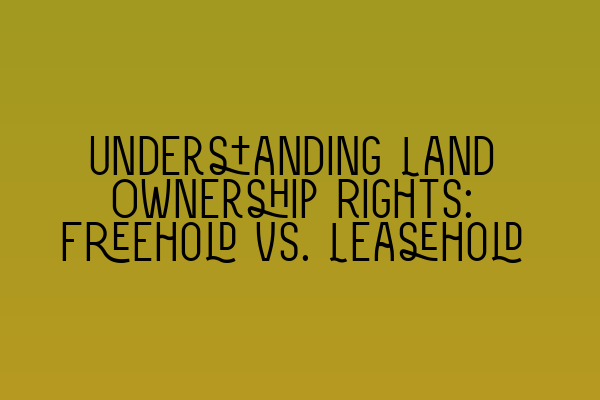Understanding Land Ownership Rights: Freehold vs. Leasehold
When it comes to land ownership, there are two primary types of ownership rights: freehold and leasehold. These terms are often used in property law to distinguish between different forms of land tenure. Understanding the differences between freehold and leasehold can help you make an informed decision when buying or selling property. In this article, we will explore the key features of both types of land ownership and highlight their respective advantages and disadvantages.
What is Freehold?
Freehold is the highest form of land ownership. When you own a freehold property, you have full and absolute ownership of both the land and any buildings or structures on it. This means that you have the right to use, occupy, and modify the property as you wish, subject to any applicable zoning regulations or planning restrictions.
One of the key advantages of freehold ownership is that it provides long-term security and control over the property. You are not bound by any lease agreements or time restrictions. Additionally, freehold properties typically appreciate in value over time, making them a sound investment.
However, with freehold ownership also comes the responsibility for maintaining the property. You are solely responsible for the maintenance, repairs, and upkeep of the land and any buildings on it. This can be a significant financial and time commitment.
What is Leasehold?
Leasehold, on the other hand, is a form of ownership that grants the right to use and occupy a property for a fixed period of time. The property is owned by the freeholder, who grants the leasehold interest to the leaseholder through a lease agreement. Leasehold agreements can range from a few years to several decades.
Leasehold ownership is commonly associated with apartment buildings, flats, and certain commercial properties. As a leaseholder, you have the right to use and enjoy the property as specified in the lease agreement. However, you must adhere to any conditions and restrictions outlined in the lease, such as obtaining permission for alterations or paying service charges for the maintenance of common areas.
One of the main benefits of leasehold ownership is that the responsibility for certain maintenance and repairs may fall on the freeholder or the management company, depending on the terms of the lease. However, leasehold properties may be subject to ground rents and service charges, which can increase over time.
Key Differences and Considerations
Now that we have a clear understanding of freehold and leasehold ownership, let’s explore some key differences and considerations:
1. Length of Ownership: Freehold ownership is indefinite and does not expire, while leasehold ownership is for a fixed period of time specified in the lease agreement.
2. Responsibilities: Freehold owners have full responsibility for the property, including maintenance and repairs. Leasehold owners may have certain responsibilities, but major structural repairs and maintenance may be the responsibility of the freeholder.
3. Costs: Freehold properties generally do not incur ongoing costs, apart from the owner’s own expenses. Leasehold properties often involve annual ground rents and service charges.
4. Financing: Financing options may vary for freehold and leasehold properties. Lenders may have stricter requirements for leasehold properties due to the limited term of ownership.
5. Resale Value: Freehold properties often have a higher resale value, as they provide long-term security and ownership. Leasehold properties may have a lower resale value due to the limited term of the lease.
Final Thoughts
When considering buying or selling property, it is important to understand the different types of land ownership rights. Freehold and leasehold both have their own advantages and disadvantages, and it ultimately depends on your specific needs and circumstances.
If you have any further questions or need legal advice regarding land ownership rights, SQE Property Law & Land Law is here to help. Our team of experienced solicitors can guide you through the complexities of property law and ensure that you make informed decisions. Contact us today!
